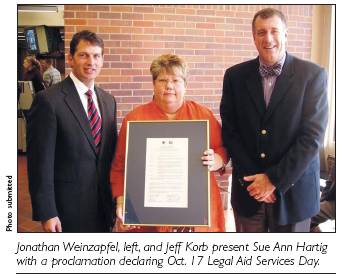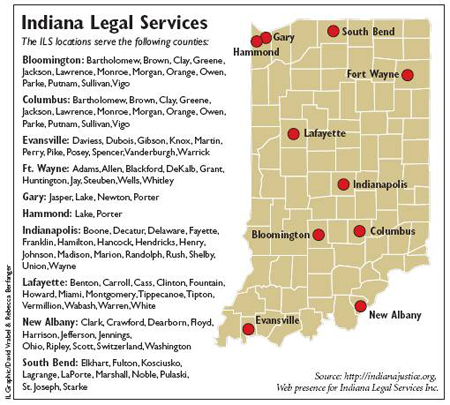Subscriber Benefit
As a subscriber you can listen to articles at work, in the car, or while you work out. Subscribe Now
With a legal aid agency closing in Fort Wayne, what's ahead for other
legal aid providers in Indiana?
Some organizations – such as the privately funded Legal Aid Society of Evansville and the Indianapolis Legal Aid Society
– and Indiana Legal Services Inc., which receives federal money annually from Legal Services Corporation – seem to be doing
OK so far. But all are unsure what's to come as 2008 winds down and as United Way campaigns continue through the end of
the year.
Budget issues led to the decision to close Legal Services of Maumee Valley in Fort Wayne, which was first reported in a story
Oct. 13 by Jennifer Mehalik in Indiana Lawyer Daily. In that story, it was reported Legal Services of Maumee Valley, which
had served the community since 1960, has been struggling to stay open for the past six to eight years, and the last two were
the most difficult, according to Business Manager Steven Morgan.
Is Maumee Valley's closing a sign of things to come?

Legal Aid Society of Evansville doesn't foresee any reason to close its doors, having enough in the reserves for at least
a few years.
The organization has been celebrating its 50th anniversary this year, culminating in a courthouse reception Oct. 17 with
about 200 guests. City and county government officials delivered a proclamation that day would be Legal Aid Services Day.
LASE receives funds from United Way, the city of Evansville, and Vanderburgh County. It also gets the first opportunity to
serve clients in Evansville and Vanderburgh County, while most of ILS' clients are in the surrounding counties in southwestern
Indiana: Daviess, Dubois, Gibson, Knox, Martin, Perry, Pike, Posey, Spencer, and Warrick.
"Legal Aid Society of Evansville and ILS get along well," said Sue Ann Hartig, the organization's executive
director. "Not many others can say that. We understand there's more than enough work for both of us, and we're
not competing for the same dollars."
In 2007, three attorneys in LASE's office represented more than 800 different cases.
"This organization has a budget of $410,000, but if the work had been done by a private firm it would have come to more
than $1.6 million in services to the community," said vice president Cathy Nestrick.
As far as how the budget will go in 2009, Hartig and Nestrick mentioned that at least one employer in Evansville will not
be participating in United Way's campaign – Bristol Meyers – which would match contributions and could account for about
10 percent of the funds United Way raises.
As far as funds from the county and city, LASE has been asked to have the same bottom line as last year.
Hartig said that intake "has stayed about the same" over the years.
 LASE employees are also involved in the community, working on the root causes of poverty.
LASE employees are also involved in the community, working on the root causes of poverty.
The attorneys also became certified with the IRS to help low-income people get their earned income tax credit.
"Something like $2 million didn't come back to community," she said. "All three attorneys … helped
prepare taxes January through April … after work hours."
In Indianapolis, ILAS is doing well, even with other area legal aid providers such as ILS and Neighborhood Christian Legal
Clinic, according to Executive Director John Floreancig.
"We mostly represent Marion County, but do work in some of the (surrounding) counties," he said.
ILS' Indianapolis office represents Boone, Decatur, Delaware, Fayette, Franklin, Hamilton, Hancock, Hendricks, Henry,
Johnson, Madison, Marion, Randolph, Rush, Shelby, Union, and Wayne counties.
"There's a huge competition for funding, obviously. ILS gets federal funding, and NCLC is constantly in the same
room with us for funding," he said.
ILAS budget will increase for next year, "only because of cost to keep the doors open," he said.
As far as what effect the economy will have on ILAS's fundraising efforts, "I haven't seen it yet," he
said. "Our gauge is how United Way does. Their campaign started just a month ago. … But we have to go forward
with a budget we think will work for us."
But without question, he said, the number of clients has increased.
"We had a line out the door this morning – our waiting room just isn't big enough," he said. "We don't
just see debt issues, but family law issues. With money being tight, the two seem to go hand-in-hand. Other issues run the
gamut."
In September alone, Floreancig said ILAS saw 200 more people than in September 2007. "It's a catch-22," he
said. "When the economy is bad, you don't get more funding, but you do get more requests for help." Last year
the organization helped 8,200 clients and this year's numbers will likely match or exceed that number.
Norman Metzger, executive director of ILS, said funding for the organization that represents all 92 counties has gone up.
"Like other organizations, we do have funding that comes and goes, that's the nature of the beast," said Metzger,
who has been with the organization for 41 years."But over the past seven years, I haven't seen our funding go down;
instead I saw it go up. … We're actually in our best shape as far as funding since 2001 right now."
He said the organization has gotten creative in terms of programs and types of grants ILS applies for, based on the needs
of the population it serves.
For instance, an IRS grant helps ILS run a tax clinic in Bloomington, and ILS has received a few grants for programs that
offer legal assistance for clients facing foreclosure.
As far as the perception of competition around the state, Metzger said, "I don't want to belabor the fact some organizations
get along well with us and some don't. But (LASE) and the pro bono plan down there, led by Beverly Corn, is terrific.
We all work together and it's a clear example of how one plus one equals four."
He added that the Indianapolis, Bloomington, and South Bend legal aid communities tend to work well amongst themselves.
As far as Maumee Valley closing, Metzger said it wasn't something ILS wanted to happen, even after a failed merger agreement
between the two organizations in the late 1990s when Legal Services Corporation required states to have a centralized office
to allocate federal funds.
After the merger of other legal aid providers, ILS opened a Fort Wayne office, and the two would refer cases to each other,
especially when there were conflicts.
"I'm saddened by the fact they're going out of business," he said,"but that isn't to say between
us and Volunteer Lawyers Program (of Northeast Indiana) that we aren't going to be able to move forward and handle the
increase in demand."
Two other sources of legal aid have Fort Wayne connections – the Allen County Bar Association's Talk to a Lawyer Today
program once a week, and the NCLC has an intake in Fort Wayne once a month.
Those interviewed for this story said while it's difficult to predict the future of funding for legal aid in Indiana,
they are trying to be mindful of their budgets and hope attorneys will continue to volunteer their time and contribute to
legal aid providers when they can.
"Maybe people will see the need, take the charge, and give more," Floreancig said.
Please enable JavaScript to view this content.
